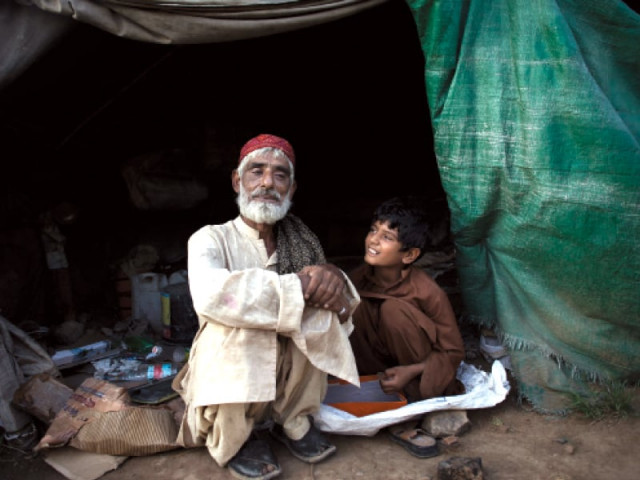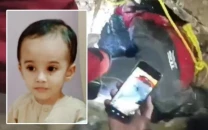Slaves of destiny: Living for the promise of another day
A father and son struggle to make ends meet.

The father and son reside in a slum located across a lavish new wedding hall. PHOTO: MYRA IQBAL/EXPRESS
When the steely shutters of shops come down and cafes dim their lights to signal closure to the lingering customer and the last of the drifters falls into a lull on a grassy belt on the highway, a father and son begin to make their way home.
Gul Rehman collects and sells recyclable trash to earn a living during the day and washes cars, along with his son Ali, at night.
“Sometimes, when he is too tired, I carry him on my shoulders,” shares 40-year-old Rehman with a fond chuckle, squatting under a tent that lies bare except for a thin comforter, two worn-out pillows, a suspending cane bag with some clothing, a dholki discovered in someone’s trash and a small pile of recyclables that he has collected over time.
Ali, 9, adjusts his shirt collar to hide the flush that appears on his cheeks, dismissing his father’s account as an exaggeration. Ali wants others to believe that he is tough, even when he is not washing cars outside a stretch of exclusive cafes at an upscale sector, not far from his own slum dwelling, braving insults and watching from afar as the jet-setters of the city spare some change, or forgetfully leave behind valuables.
Ali’s eyes grow big as he recalls the time he found an iphone, a swanky gadget whose value he is aware of even though Ali has never attended school. “I even know how to attend calls on it!” he shared excitedly, “So I picked up the owner’s call and returned it to him.”
Rehman, a former taxi driver, fell in debt after the 2005 earthquake that decimated his village in Mansehra, losing his wife a few months later to a spinal injury she sustained during the jolt. “My nephew insisted on a spontaneous visit to Mansehra, not wanting to relay the news to me while we were in Rawalpindi,” Rehman remembers his heart sinking at the sight of the destroyed houses. “At that point, it seemed like no one was left alive.”
When reconstruction began, the allocated Rs150,000 fell short and Rehman’s debts began to pile on top of his losses. His brothers took over the property, and Rehman was forced to migrate to Islamabad, one-year-old Ali in his arms.
“It was difficult to raise him alone,” confided Rehman, his beard entirely gray, unlike the photograph of the young mustachioed man on his identification card. “There is no sense of community here,” Rehman explained that theft is common within the slum and few people are willing to share even though they work on the same streets, live in the same dump and go to the loo in the same fields. “I sold everything, my taxi, my house, even my pride, just to raise my son.”
Plucked out of the slum, located in a small dip of empty land across a lavish new wedding hall, Ali looks like a sharp school-going boy, his rust-colored shalwar kurta showing no stains or dirt. “Ali wants to go to school,” shared Rehman, “He wants everything that little boys his age want. Yesterday he asked for a mobile phone!” He laughed, looking at Ali who leaned shyly against the cane that props the tent up.
Rehman, who gave up driving to take care of his son, cannot return home for fear of debt collectors. All his hopes are vested in Ali, but despite the claims, the squalid conditions they live in discourage the kind of progress that Rehman dreams of. “To send him to school, I have to ensure he is showered and in clean clothing,” said Rehman, who worries about his son’s future, but needs the extra hand, enabling an existence that is both sad and beautifully simple.
“We go to work together, share a small meal at a cheap restaurant and come home tired together, my Ali on my lap if we manage to get a free taxi ride or on my shoulders if we are walking, to sleep on the earthen floor of our tent to the sounds of the woods and the promise of another day.”
Published in The Express Tribune, July 26th, 2013.



















COMMENTS
Comments are moderated and generally will be posted if they are on-topic and not abusive.
For more information, please see our Comments FAQ